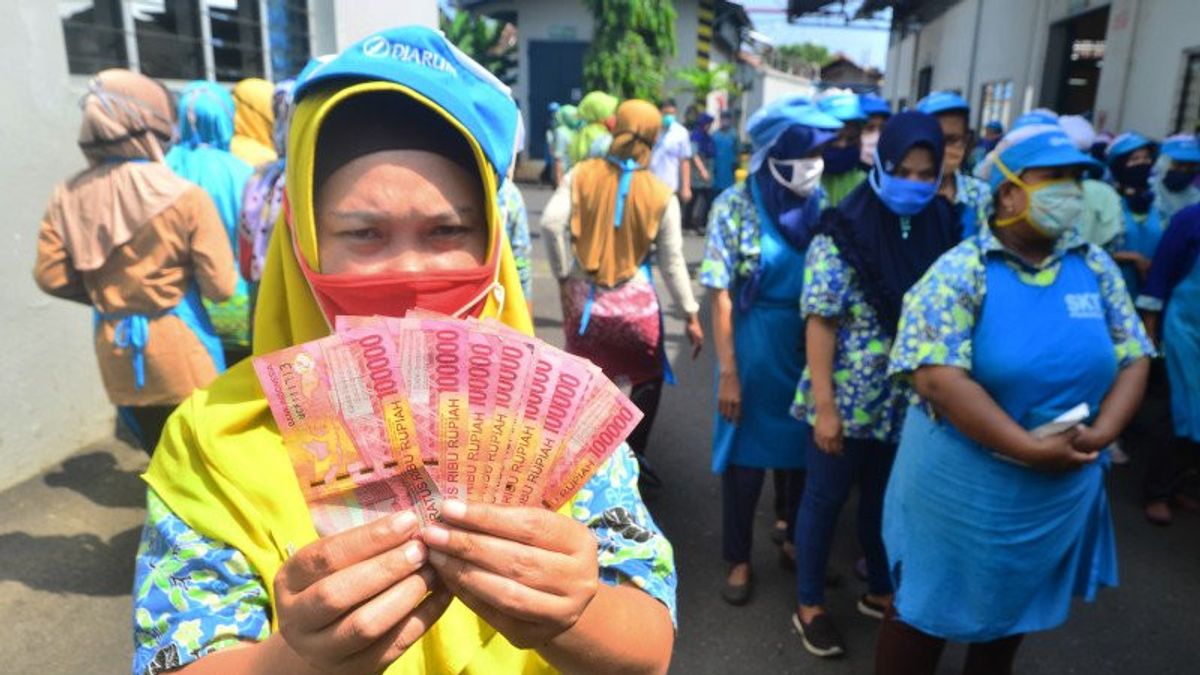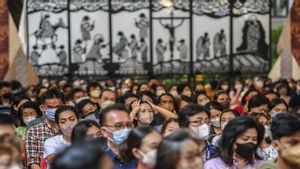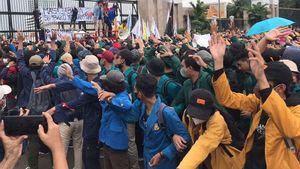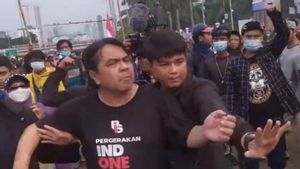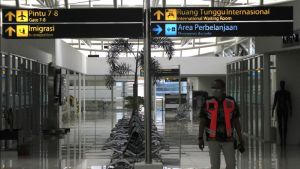JAKARTA - The signing of the basic rules for the provision of holiday allowances (THR) and the 13th salary for State Civil Apparatus (ASN), TNI, Polri, Regional ASN, retirees, pension recipients, and other state officials was carried out by President Jokowi on Wednesday, April 13, 2022.
The signing can be seen through a video uploaded on the Presidential Secretariat's YouTube, Thursday, April 14. "I have signed a government regulation on THR and the 13th salary," said Jokowi.
In addition, the THR that must be paid by the company to employees cannot be done in stages or installments, according to the certainty provided by the Ministry of Manpower (Kemenaker).
“If asked, can the current THR still be agreed upon? Can't anymore. The Minister has emphasized that THR must be paid in cash and cannot be paid in installments," said the Coordinator of Wage Norms, Rest Time, and Social Security at the Ministry of Manpower, Sri Astuti during a virtual discussion in Jakarta as quoted by Antara, Thursday, April 14.
Previously, the Minister of Manpower (Menaker) Ida Fauziyah had issued a Circular Letter of the Minister of Manpower of the Republic of Indonesia Number M/1/HK.04/IV/2022 regarding the Implementation of the Granting of Religious Holiday Allowances in 2022 for Workers/Labourers in Companies.

To anticipate THR violations by companies, the Ministry of Manpower has also established a 2022 THR Command Post which can be accessed virtually. The Ministry of Manpower also encourages each province to establish an integrated THR Post on the poskothr.kemnaker website.
In the circular it is written, THR payments before Eid this year must be paid in accordance with statutory provisions no later than seven days before Eid.
Companies that are late in making THR payments will receive consequences as stated in PP Number 36 of 2021 regarding wages. The sanction is a fine of five percent of the total THR that must be paid, reported by setkab.go.id.
Before entering the month of Ramadan, the President of the Indonesian Trade Union Association (Aspek) Mirah Sumirat in a press statement quoted by Antara, Thursday, March 31, 2022, had sent a letter to the Minister of Manpower. The contents ask the government not to give permission to entrepreneurs to delay payments or pay THR in installments.
"We remind early on that the government is careful in issuing THR regulations related to workers," he said.
Mirah said the letter was intentionally sent a month before Eid. Even before entering the month of Ramadan.
"This is to remind early on so that the government is not careless in issuing regulations related to workers, such as issuing circulars or other regulations that provide concessions to companies regarding THR," he said.
During the pandemic, the government gave concessions to companies not to pay THR to workers, because of the company's condition that was affected. According to Mirah, in the midst of the current difficult conditions, when the prices of basic necessities rise, it is hoped that the government will take more sides and care for the poor.
THR Violation Cases
The trend of reporting complaints on THR payments to workers always increases from year to year. The 2019 Ministry of Manpower THR complaint post with 251 reports. In 2020 it will be 410 and there will be an addition in 2021 to 1,150 reports.
Complaints about THR violations have not been followed up properly. The mechanism for complaints, which are handled within H-7, is considered too short to act on problems in the field because the red date or joint leave is approaching. Permanent workers do not get THR because it is delayed long after the holiday.

This year's THR policy is considered to be more pro-employee compared to 2020. At that time the government relaxed private companies to pay THR by delaying or paying in installments, because many businesses were slumped by the impact of COVID-19. However, at the practical level, the THR 2022 payment policy must be monitored so that there are no more violations.
Before the pandemic era, there were always problems before the THR, and entering the pandemic era this problem was even more complicated because of Indonesia's bad economic situation. The provision of severance pay, and the settlement of THR is a complex problem that always triggers disputes between workers and the company and always causes demonstrations. It is undeniable that COVID-19 is an element that causes workers' rights to not be fulfilled. This is a violation of the Manpower Act No. 13 of 2003.
The Origins of THR
The topic that workers talk about the most every time before Eid besides going home is THR. THR is like an annual ritual for all workers in Indonesia. THR is income not wages received by workers.
THR exists because the government establishes its legal basis through the Minister of Manpower Regulation No. 6 of 2016, namely the existence of Religious Holiday Allowances for Workers/Labourers in the company.
The calculation system is that if the employee has worked a full year or more, the THR that will be paid is one-time salary. As for those less than a year, it is adjusted according to the form of proportional calculation
THR has its own story in Indonesian history. It began in the era of the Soekiman Wirjosandjojo Cabinet from the Masyumi party who was the 6th Prime Minister and Minister of Home Affairs of Indonesia, 27 April 1951-3 April 1952.
The initial goal of giving THR is believed to be able to improve the welfare of civil servants (PNS), which became one of the programs of Soekiman's cabinet. At that time the civil service group consisted of priyayi, menak, aristocrats, soldiers, and their classmates.

The distribution of THR in the cabinet era is paid at the end of the month of Ramadan, in the amount of IDR 125 to IDR 200. This allowance is also given in the form of rice.
However, the provision of Lebaran allowances to civil servants caused social jealousy from the working class. As a form of this, on February 13, 1952, the workers held a strike. Unfortunately, this demand was not accepted by the Soekiman Cabinet Government.
To reduce demands, the government through the Minister of Labor SM Abidin then issued SE No. 3667/1954, which regulates the amount of THR for workers other than civil servants, which is one-twelfth of the salary received in a one year period. The minimum is IDR 50 and the maximum is IDR 300.
This happened during the cabinet of Ali Sastromidjojo, who was the 8th Prime Minister of Indonesia. However, because the circular is an advisory, many companies consider it voluntary and not obliged to pay THR.
Finally, the THR mechanism was officially regulated in 1994. Through the Minister of Manpower Regulation No. 04 of 1994, which regulates THR for private workers in companies. In this new regulation, the government requires all companies to pay THR for employees who have worked for at least three months. This policy is the forerunner of the current THR.
Comparison of Other Countries
Has THR become one of the phrases 'only on Indonesia'? In general, countries other than Indonesia do not provide allowances for religious holidays. However, there is an allowance paid by the company at the time of the holiday season, which is called a holiday allowance.
Malaysia
Malaysia also recognizes religious holiday allowances. In Malaysia, THR is known as special financial assistance for Eid al-Fitr.
In Johor, the state of Malaysia, the nominal amount for civil servants is half a month's salary or a minimum of RM1000 or around IDR 3.4 million.
For the celebration of Eid al-Fitr 2022, as quoted from Antara April 5, Prime Minister Ismail Sabri Yaakob said the Malaysian government approved special financial assistance for Eid al-Fitr of RM500 or IDR 1.7 million to all civil servants to be paid on April 28, 2022.
In Europe, examples of countries that have policies similar to THR, known as holiday allowances, are the windmill countries of the Netherlands and Denmark. It is considered similar because both countries pay it during the holiday season.

Dutch
If THR is paid in Indonesia, it becomes a personal right, but it is different from the Netherlands. Reporting from Payingit-international, the Dutch-style THR is paid through their salary contributions, namely as of January 2020 the standard rate is a minimum of 8 percent of the total salary, or 8.33 percent for temporary workers. Payments on employment range from June to May or the Dutch fiscal year.
Holiday allowance in this windmill country was known in the early 1920s, as a company bonus to its employees specifically for holidays. In 1960 the policy changed because some workers chose to travel abroad during the holidays. So that it is converted into extra payments outside of the basic salary, in Indonesia is known as allowances.
Employees will receive the 13th salary every May. So employees can make plans ahead of time for summer vacation from the money that has been saved. The payout will appear on your May payslip.
Anyone who works in the Netherlands will receive an allowance known as a holiday allowance.
SEE ALSO:
Denmark
The European-style holiday allowance or THR is also applied in Denmark. Launching from lifeindenmark.borger, Denmark also applies the same pattern as the Netherlands.
The allowance is based on a year's allowance, which is calculated from the leave allowance per month. The amount of the allowance is generally 12.5 percent of salary. But we have to quickly make plans and set a designated holiday on May 1 every year. Benefits can be lost if the worker is late in proposing.
THR is part of the company's obligation to fulfill their rights, this should be realized so that the enthusiasm and productivity of the workers remains lit. Making workers' rights a priority for every company should become a company culture. Hopefully!
The English, Chinese, Japanese, Arabic, and French versions are automatically generated by the AI. So there may still be inaccuracies in translating, please always see Indonesian as our main language. (system supported by DigitalSiber.id)
